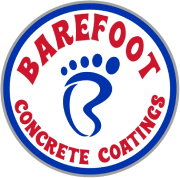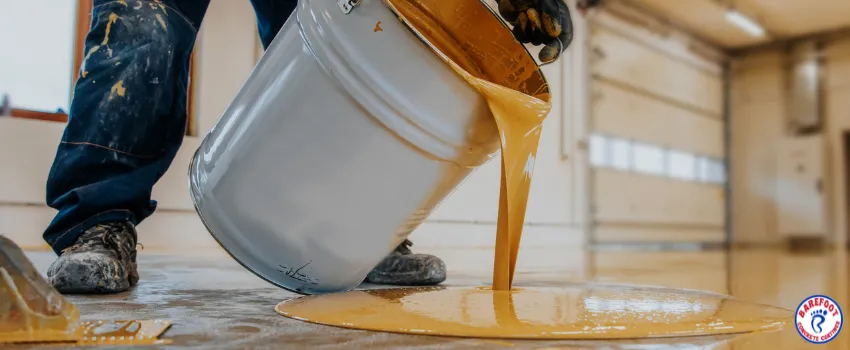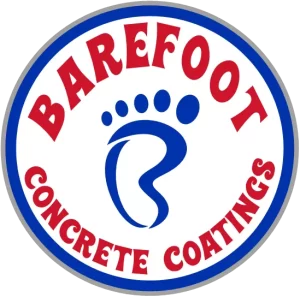Basements are often underutilized spaces in many homes. They serve as storage areas or laundry rooms, but they can become so much more with the right touch. One way to make the most of your basement is by giving it a makeover, including coating the floor.
The basement floor is different from the rest of the house. It’s prone to moisture, coldness, and even flooding. So, if you want to use your basement as a living area, a home office, or a recreational space, you need to address these challenges, and that’s where professional basement floor coating comes in.
Benefits of a Professional Basement Floor Coating
Investing in a professional basement floor coating comes with a range of advantages beyond just enhancing the aesthetics of your lower level. Here are some benefits you can expect when you decide to coat your basement floor with a high-quality floor coating:
1. Moisture Protection
One of the biggest challenges in coating basement floors is dealing with moisture. Since basements are below ground level, they are more prone to water leaks and seepage. A coating designed for basement floors is a barrier, preventing moisture from penetrating the floor and causing damage, such as warping, mold, and mildew growth.
2. Increased Durability
Basement floors typically endure more wear and tear than other house areas. Providing your floor with a professional basement floor coating can significantly extend its lifespan, protecting the underlying material from scratches, stains, and chemical spills. This also minimizes the frequency of repairs and replacements, ultimately saving you both time and money over time.
3. Improved Safety
A professional basement floor coating can provide slip resistance to your floor, enhancing the safety of your basement. Since basement floors are more moisture-prone, they can become slippery, increasing the risk of accidents. However, with the right floor coating, you can create a safer environment, as it will offer traction even when the floor is wet.
4. Enhanced Aesthetics
Aesthetics play an important role in creating a welcoming and functional basement. Coating your basement floor can help you achieve the desired look, as coatings come in various colors and finishes. Whether you prefer a glossy finish that reflects light and adds depth or a more textured look for added character, a professional basement floor coating can tie together the overall design of the space.
5. Easy Maintenance
Who wants a floor that requires constant, high-maintenance attention? The good news is that a coated basement floor can be much easier to maintain than other types of flooring. A professional basement floor coating acts as a protective layer, making the floor resistant to stains and dirt. To keep your basement looking its best, you’ll only need regular sweeping and occasional mopping to remove any grime or spills.
Professional Basement Floor Coating Process
Once you’ve decided on the best basement floor coating for your needs, it’s time to consider whether you want to tackle the project yourself or hire professionals. While a DIY approach can save money, hiring experts can ensure a more seamless and durable result. If you’re interested in adding a professional basement floor coating, here’s a general process you can expect:
1. Surface Preparation
Preparing the surface is the first step in the professional basement floor coating process. This involves cleaning the floor thoroughly to remove dirt, dust, or debris. In some cases, etching or grinding may be necessary to create a suitable surface for the coating to adhere to. Surface preparation aims to achieve a clean and smooth floor, ensuring optimal coating performance.
2. Repair and Patching
Before coating basement floors, any existing cracks, chips, or imperfections in the basement floor should be repaired and patched. This step helps to ensure a level surface and prevents moisture from seeping through the floor, which can lead to future damage. The type of repair required will depend on the extent of the damage, but commonly used materials include concrete fillers and epoxy-based compounds.
3. Priming
In some cases, a primer may be necessary to enhance the adhesion of the coating to the basement floor. The primer is applied after the repairs have cured and is left to dry for the recommended time. It creates a bond between the floor and the coating, improving the overall durability and performance of the finished product.
4. Coating Application
Once the surface is prepared and primed, it’s time for the main event – applying the basement floor coating. The specific application method will depend on the type of coating chosen, as each has its unique requirements. Some coatings, such as epoxy and polyurethane, are typically applied using rollers or brushes, while others, like stains or overlays, may require different techniques.
5. Curing and Drying
After applying the basement floor coating, it needs time to cure and dry properly. The curing process can take several days, during which the coating hardens and fully bonds with the floor. It’s crucial to avoid foot traffic or placing heavy objects on the floor during this time to prevent damage and ensure the best results.
6. Optional Finishing Touches
Depending on the type of coating chosen and the desired aesthetic, additional finishing touches may be needed. For example, if you’ve opted for an epoxy coating, you may have the option to add decorative flakes or a glossy topcoat. If you’ve chosen a stained concrete floor, a sealer may be applied to enhance the color and protect the surface. These optional steps can further customize the look of the basement floor and provide added protection.
7. Post-Application Care
Once the basement floor coating has fully cured, it’s essential to implement proper post-application care to prolong its lifespan. This includes regular cleaning using non-abrasive materials to avoid scratching the surface. If the coating is damaged or worn over time, prompt repairs should be undertaken to prevent moisture from reaching the underlying floor.
8. Regular Maintenance
Lastly, including basement floor coating upkeep in your regular maintenance routine is crucial. This typically involves periodic inspections to check for any signs of wear or damage. Depending on the coating type and usage, maintenance may also include reapplication or touch-ups to ensure ongoing protection and aesthetic appeal.
Types of Basement Floor Coating Systems
Various coatings can be used for basement floors, each with its characteristics and benefits. Listed below are the most common options for a professional basement floor coating:
1. Epoxy Coatings
Epoxy coatings are known for their durability and resistance to chemicals and stains. They can create a seamless and glossy finish, making them popular for basements used as entertainment areas or workshops. However, they can be expensive and may require professional installation.
2. Polyaspartic Coatings
Often considered one of the best basement floor coatings on the market, Polyaspartic basement floor coatings are considered to be stronger than epoxy basement coatings. Polyaspartic coatings have a much faster curing time, often setting within hours as opposed to days, which helps minimize downtime and reduce the risk of dust and other contaminants affecting the finish. Polyaspartic coatings are also generally more resistant to chemicals and abrasives, offering enhanced protection against stains, spillages, and regular wear and tear. All these attributes combined contribute to a longer-lasting and more resilient flooring solution, making polyaspartic coatings a preferable choice for basement floors over traditional epoxy coatings.
2. Concrete Stains
Concrete stains are ideal for those who want to enhance the natural beauty of the basement floor. They come in various colors, allowing you to achieve various effects, from earthy tones to vibrant hues. While stains can provide a visually appealing finish, they offer less protection than other coating options in this basement floor coating guide.
3. Waterproof Sealants
Waterproof sealants are specifically designed to prevent moisture penetration in coating basement floors. They are an excellent choice for basements at risk of water damage. Sealants can be clear or tinted and are often used with other coatings to enhance their protective properties.
4. Polyurethane Coatings
Polyurethane coatings are known for their resistance to scratches and abrasions. They can be used as a standalone coating or topcoat for added protection. These coatings are suitable for basements used as play areas or storage spaces.
5. Paint
Paint is the most affordable and accessible option in coating basement floors in this basement floor coating guide. It comes in a variety of colors, allowing you to customize the look of your basement easily. However, paint is prone to chipping and may require frequent touch-ups in high-traffic areas.
Most Durable Basement Floor Coating
Regarding durability, professional basement floor coating experts agree that epoxy coatings are at the top. Epoxy is known for its ability to withstand heavy foot traffic, resist moisture and chemicals, and hold up well over time. It is a resilient coating that can handle any basement’s demands, whether used for storage, as a recreation area, or even as a living space.
Other durable options for coating basement floors include concrete stains and concrete sealers. While these coatings may not offer the same level of protection as epoxy, they can still provide long-lasting results, particularly if the basement has minimal moisture issues.
Factors to Consider When Choosing a Basement Floor Coating
With a wide range of professional basement floor coating options, selecting the right one for your basement floor can be challenging. Posted below in this basement floor coating guide are factors one should consider when choosing the right coating:
1. The Intended Use of the Basement
The coating you choose should complement the purpose of the basement. If it’s planned as a recreational area or a home gym, a different type of professional basement floor coating may be required compared to a basement intended for storage.
2. The Level of Moisture in the Basement
Moisture is a significant consideration in coating basement floors. If your basement has a history of leaks or is prone to dampness, a waterproof coating or a combination of sealants may be the best choice.
3. Your Budget
Determining your budget for the project is essential, as a professional basement floor coating can be expensive, depending on the type. If you have a higher budget, you may consider options like epoxy coatings, which offer greater durability and a more polished appearance. This is important to remember in this basement floor coating guide.
4. The Desired Aesthetic
If the look of the floor is a priority, you’ll want to choose a professional basement floor coating that can achieve the desired aesthetic. This could be a specific color or a finish that complements the overall design of the basement. Some popular options for achieving a desired aesthetic include epoxy coatings, stained concrete, and decorative overlays.
The Bottom Line
Coating basement floors is a wise investment that can enhance the overall functionality and appearance of the space. When choosing a coating, consider the basement’s purpose, moisture levels, and your desired aesthetic. An epoxy coating is recommended in this basement floor coating guide for the most durable and long-lasting option. Its resistance to moisture and chemicals can help protect the floor and extend its lifespan.
Looking for Basement Floor Coating in Bountiful, UT?
If you’re looking for basement floor coatings in Utah and Texas, Barefoot Concrete Coatings has got you covered. We are considered one of the best Polyaspartic basement floor installers and we can’t wait to work with you in your home. Contact us today to request a free quote and take the first step toward your dream basement!



